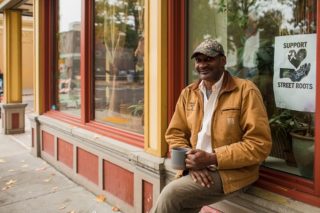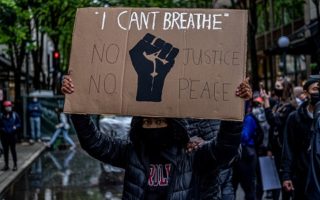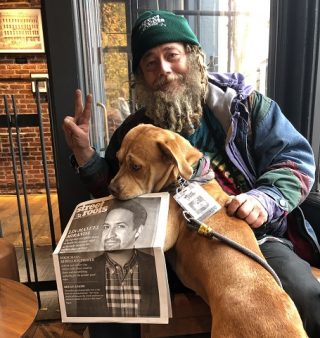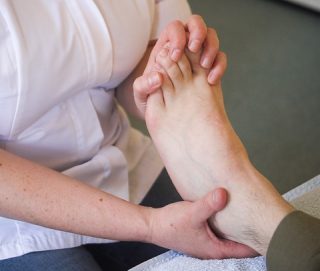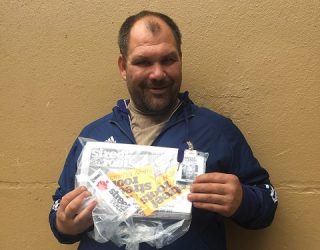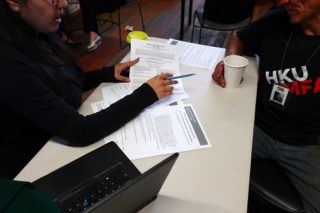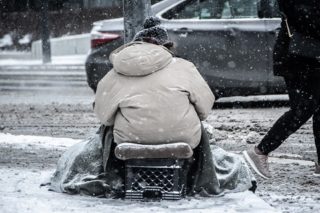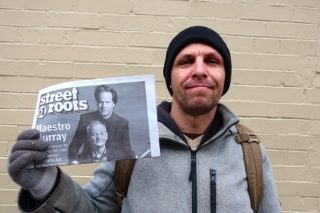Housing for the People: “I came back to life in a time of trouble”
Gary Barker, who sells Portland street paper Street Roots, writes for the latest in INSP’s Housing for the People – a column that allows those with lived experience of poverty, homelessness and insecure housing tell their story – writes about being “in a hell of my own doing”, but how with the pandemic making the world seem like world was falling apart, circumstances in Gary’s life suddenly made things start to come together. He writes about his work as an ambassador for Street Roots and leading on its MoJo scheme to get vendors into journalism, and how being in housing allows him to “find a way to get problems off my mind”.
Outgoing Street Roots editor Joanne Zuhl: “Seeing how far we’ve come is heartwarming. It’s a testament to the hundreds of vendors and volunteers, writers and readers who believed in our mission”
As she prepares to leave the Portland street paper after more than 18 years at the helm, Street Roots editor Joanne Zuhl talked to INSP about her lengthy stint leading one of the street paper network’s most established publications and where she leaves the paper after one of the most unpredictable years of her tenure.
Street Roots vendor Chris Drake: “Treat me like any other man”
Portland street paper vendor Chris Drake discusses misconceptions about trans people and what visibility means to him.
Police response to protests shakes houseless Portlanders
The discord of protests is “quite an ordeal” for people living outside, including those with PTSD who are troubled by loud noises. Street Roots reports on how Portland’s homeless community has reacted to the protests.
Struck by a rubber bullet: Street Roots staffer describes her experience as a Black woman at a Portland protest
“Surviving police brutality is a different type of trauma known to an endless number of Black people,” writes Street Roots staffer Sophie Maziraga.
Black lives matter: Protest movement against racism, oppression and police brutality sweeps across America
Since the death of George Floyd, a young black man killed by a white police officer as his colleagues stood idly by, protests have sprung up across the US and other parts of the world calling for an end to systemic racial injustices and police brutality. American street papers were present at many of those protests.
Drug and alcohol recovery in a time of isolation
As recovery support groups across the US cancel and move online due to COVID-19 measures, an increase in relapses could compound demands on health care providers.
Street survival in Portland in the age of coronavirus
Street Roots executive director Kaia Sand sends a dispatch from Oregon after visiting a small homeless camp housing a handful of the Portland street paper’s vendors who have become proactive about safeguarding themselves and staying healthy as the coronavirus panic sweeps the Pacific Northwest United States.
As coronavirus outbreak worsens, street papers and their staff respond
With coronavirus cases across the world now at well over 100,000, Italy is in lockdown and the US west coast is bearing the brunt of Covid-19’s appearance in America. INSP spoke again with street paper staff about the effect it is having on their organisations and vendors, with particular attention given to how staff are assisting vendors to stay safe and healthy.
Life on the Streets: The full moon
In history and in pop culture, the full moon continually sparks feelings of fear, curiosity, and excitement. In the latest addition to ‘Life on the Streets’, the Street Roots series that tackles issues people facing homelessness experience, vendors speak on their own encounters with the ever-mysterious full moon.
Life on the Streets: Public transit
Portland’s Street Roots has a periodic column about the parts of homelessness most people don’t talk about. Some vendors say they’ve seen public transport inspectors profiling homeless people. Here they talk about their experiences.
Life on the Streets: Fear goes both ways
Portland’s Street Roots has a periodic column about the parts of homelessness most people don’t talk about. That homeless people are dangerous is a clear misconception, vendors say. And for some on the streets, it’s housed people who are feared.
Our vendors: Dwd and Kephirah (Street Roots, Portland, USA)
Dwd sells Street Roots from a pitch shared with other vendors near the Starbucks at Northwest Couch Street and 11th Avenue in Portland with the help of his trusty canine friend Kephirah. Dwd is enjoying his work as a Street Roots vendor and is learning about photojournalism with the organisation’s help. He hopes to engage with the public about the great work that the paper is doing to support vendors as they work together with the community.
Life on the streets: Foot health, a never-ending struggle
Portland’s Street Roots has a periodic column about the parts of homelessness most people don’t talk about. When you’re on your feet all day, wearing tatty, worn out and often sodden shoes, and then sharing space with groups of people in shelters that aren’t exactly kept in the best state, it’s no wonder people on the street struggle with maintaining healthy feet. Street Roots spoke to vendors about this often overlooked problem.
Life on the streets: Growing old
Portland’s Street Roots has a periodic column about the parts of homelessness most people don’t talk about. In the US, the proportion of elderly people experiencing poverty and homelessness has risen by more than 20 per cent in the past 15 years. For this instalment, Street Roots explores what being homeless is like for people in the later years of their lives.
Our vendors: Randy Humphreys (Street Roots, Portland, USA)
Randy Humphreys has been working as a Street Roots vendor for a few months and experiences great enjoyment in his work. He enjoys the contact that he has with his customers and is focusing on leaving his past behind him and moving forward with his life.
Life on the Streets: Beating the heat
Summer may be over, but due to pollution, the trapping of heat in urban areas and global warming, the autumn months may not prove to be much cooler for people living on the streets. In a periodic column about the parts of homelessness most people don’t talk about, Street Roots vendors talk about the burden of living on the streets when the weather is hot.
Life on the Streets: Prone to loss
Portland’s Street Roots has a periodic column about the parts of homelessness most people don’t talk about. People in extreme poverty are experts on loss, whether it be their belongings, their privacy, their dignity or anything else.
Life on the Streets: The proliferation of private guards
Portland’s Street Roots has a periodic column about the parts of homelessness most people don’t talk about. Some Street Roots vendors welcome added security; others say private guards – who are not police – overstep their bounds.
Read Street Roots’ award-winning cultural feature: ‘She Shreds: Ripping up the rulebook on female guitarists’
Fabi Reyna is the editor of She Shreds, a groundbreaking magazine that is a revolutionary platform for female guitarists. Since being launched in 2013, the magazine has championed itself as being an inclusive space that celebrates female guitarists – a demographic that is often overlooked in the industry. Here, Reyna looks back on five years of success and contemplates what is in store in the magazine’s future. Last night at the 2019 INSP Awards, this piece won Best Cultural Feature. Now, you can read it in full.
Stress on the streets
All of us experience some degree of stress in our everyday lives. For those who are homeless, however, stress can be a debilitating and chronic issue. Street Roots talked to a number of individuals about their experiences of life on the streets and about the impact that stress has had on their lives. This is especially pertinent as delegates at this year’s ongoing Global Street Paper Summit talk about dealing with conflict and vendor welfare.
“You have to wait in line constantly”
Portland’s Street Roots has a periodic column about the parts of homelessness most people don’t talk about. Here, vendors talk about how they’re “spending a hell of a lot of time” waiting around.
Street Roots vendors and attorneys partner for expungement pilot
The homeless community has long been the target of police action and prosecution, often creating an insurmountable backlog of tickets and non-violent misdemeanors that can effectively shut people off from safe housing, education and jobs, and perpetuating cycles of poverty. Portland’s Street Roots partnered with other organisations on a project aimed at helping vendors attain a clean slate.
Our vendors: Brian Lane (Street Roots, Portland, USA)
Brian Lane credits his Lummi Tribe heritage with helping him to recover from a traumatic injury: he feels that the spirit of his tribal lineage gave him the ability to pull through. Now homeless and living with a disability, Brian has found something else that is helping him to navigate his way through life: Street Roots. His involvement with the magazine has brought growth, support and the possibility of moving forward.
Sick with nowhere to go
Portland’s Street Roots has a periodic column about the parts of homelessness most people don’t talk about. In this instalment, vendors describe how a common cold can potentially turn into a life threatening illness when they have nowhere to go to recuperate while sick.
Surviving the cold
Portland’s Street Roots has a periodic column about the parts of homelessness most people don’t talk about. In this instalment, vendors talk about how they get through Portland winters on the streets, sometimes having to resort to novel, and in some cases dangerous, ideas.
The pain, cost and stigma of parasites from living on the streets
Portland’s Street Roots has started a periodic column about the parts of homelessness most people don’t talk about. In this instalment, now shared with INSP, vendors describe their experiences of picking up parasites and bugs, such as head lice and scabies, mainly at hostels and shelters, and the effect it has on an already difficult way of living.
Our vendors: Jason Sheer (Street Roots, Portland, USA)
Jason Sheer has been involved with Street Roots for eight years and he credits the magazine with bringing an increased level of stability into his life. Here, he talks about his experience of homelessness and the support that he has received from Street Roots. He is hopeful about what the future will bring.




